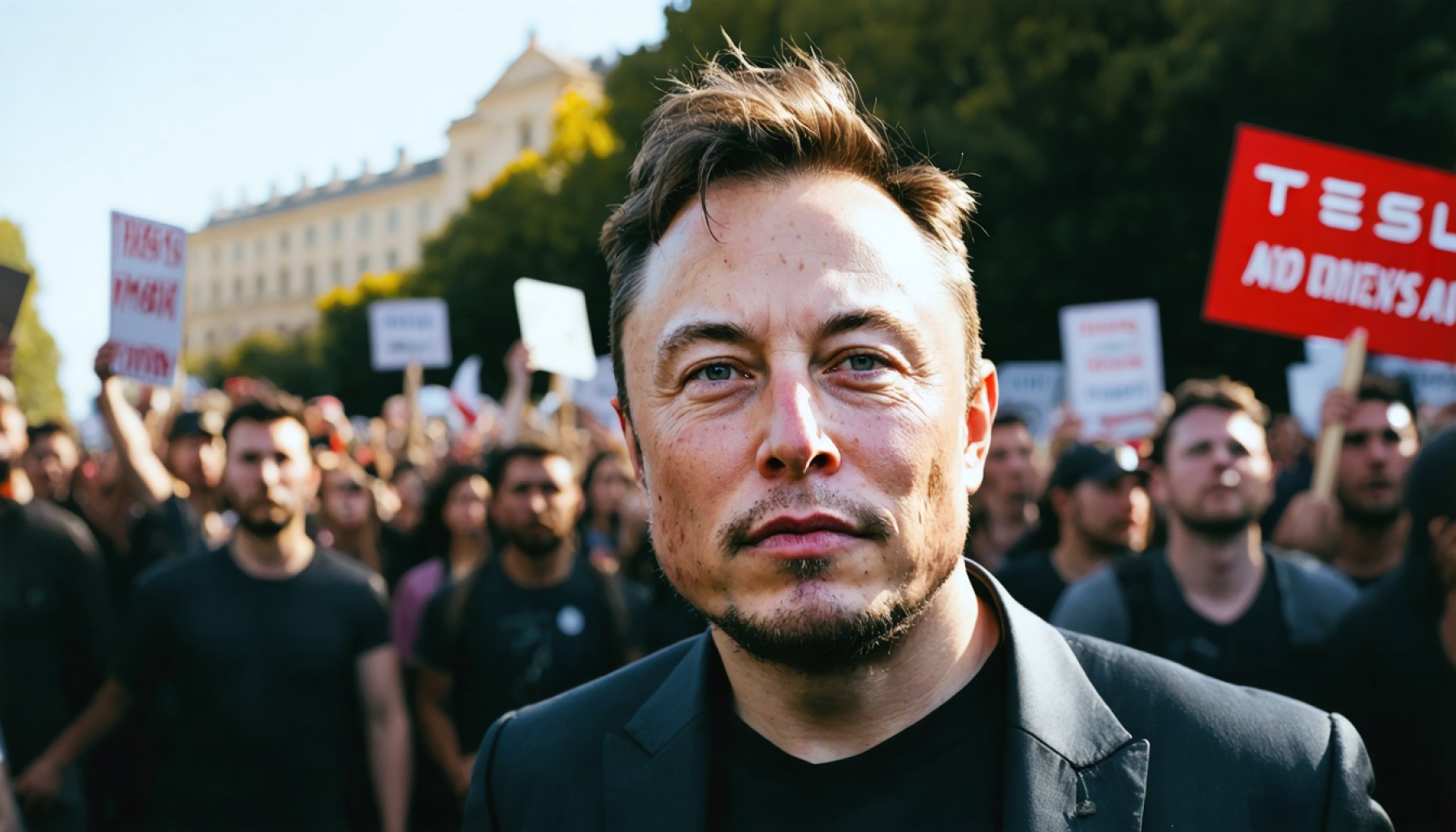- Activist group “Tesla Takedown” protests in Raleigh against Elon Musk’s influence in political and economic spheres.
- The movement criticizes Musk’s advisory role in the Trump administration’s “Doge Committee,” which supports controversial federal job and financial cuts.
- The protest is part of a larger nationwide dissent against Musk, marked by the largest rally to date and significant media attention.
- Tesla’s stock has dropped 50% since the protests began, indicating potential shifts in investor confidence due to activist pressure.
- The situation has drawn FBI attention, with a task force investigating potential vandalism and related incidents.
- Musk and Tesla emphasize resilience, acknowledging challenges while urging supporters to stay loyal.
- The protests highlight the tension between corporate power and grassroots activism, emphasizing the demand for accountability from influential public figures.
Storm clouds gather over Raleigh, North Carolina, yet it’s not the weather that residents are eyeing anxiously—it’s the escalating protest at the local Tesla dealership. A fervent energy courses through the crowd as members of “Tesla Takedown,” a determined activist group, rally against Elon Musk’s contentious influence in political and economic spheres. Their mission? Discourage people from purchasing Tesla vehicles and divest from the company.
This scene unfolds as part of a nationwide wave of dissent against Musk, the visionary yet polarizing architect of Tesla, SpaceX, and various other ventures. A palpable tension crackles through the air, amplified by colorful placards and determined chants. The group’s primary contention is Musk’s involvement in the Trump administration, specifically his advisory role in what is often termed the “Doge Committee.” Critics accuse this committee of advocating for drastic federal job and financial cuts, raising profound ethical questions about its long-term impact on social and humanitarian programs like USAID.
Notably, this is the sixth protest of its kind, and it’s the largest turnout yet. Organizers, emboldened by the growing support, believe their movement is creating tangible economic pressure on Musk’s empire. Emboldened activists assert that Musk, the wealthiest human on Earth, should realize that public accountability accompanies his vast fortune and influence. Since the inauguration, Tesla’s stock valuation has plunged by an eye-popping 50%, highlighting a potential shift in investor confidence.
Inside Tesla’s marble-adorned halls, Elon Musk attempts to quell the unrest. He acknowledges the rough patches but urges steadfastness among his supporters. Meanwhile, the FBI has taken notice, forming a task force to investigate related incidents across the nation, recognizing the potential for vandalism and other escalations.
As the world witnesses this clash between corporate might and grassroots fervor, the unfolding narrative serves as a stark reminder: Public figures wielding immense power must navigate the delicate balance between innovation and social responsibility. The protests underscore an essential truth—when leaders falter under the weight of their decisions, the people will rise to hold them accountable.
In the heart of Raleigh, amid the shouts and slogans, a key message resonates: economic and political choices reverberate through communities, compelling individuals to question and challenge those at the helm. The battle at Tesla’s gates is only beginning, but its impact promises to ripple outward, altering the fabric of corporate-public relations in unanticipated ways.
Elon Musk Faces Rising Resistance: What You Need to Know About the Tesla Protests
Background: The Roots of the Protests
The protests against Tesla and Elon Musk in Raleigh, North Carolina, are driven by a broader national movement questioning Musk’s influence in politics and economics. Their concerns focus on his advisory role in a controversial policy committee linked to the Trump administration, termed the “Doge Committee,” which has been criticized for advocating federal job cuts impacting social programs such as USAID.
Key Facts and Insights
The Scale and Scope of the Protests
– Nationwide Impact: The protest in Raleigh marks the sixth major protest against Musk and is the largest to date. This indicates growing momentum among activists nationwide.
– Economic Influence: Critics argue that public accountability should accompany Musk’s business success, citing a 50% drop in Tesla’s stock as a sign of declining investor confidence.
Elon Musk’s Response
– Elon Musk has publicly recognized the protests and calls for support and resilience among stakeholders. His response underscores the tension between his visionary ambitions and the social responsibility expectations from the public.
Pressing Questions
Why Are People Protesting Tesla Now?
The protests are fueled by dissatisfaction with Musk’s political affiliations and perceived disregard for social welfare due to his involvement in the “Doge Committee.” Activists demand a more socially responsible posture from Musk and his companies.
What Could Be the Long-Term Market Impact?
Tesla’s stock valuation drop indicates potential investor unease. This may signal a broader trend of consumers and investors prioritizing ethical considerations in business, impacting Tesla’s market position.
How-To: Responding to Corporate-Activism Tensions
1. Stay Informed: Keep abreast of developments through credible news sources and open channels of communication with stakeholders.
2. Engage Meaningfully: Address concerns directly with stakeholders, demonstrating transparency and accountability.
3. Evaluate Impacts: Regularly assess the social and economic impacts of company policies and make necessary adjustments to align with community values.
Controversies & Limitations
Ethical Concerns
The main ethical issue arises from Musk’s perceived prioritization of market interests over public welfare, inviting scrutiny of how corporate leaders balance profit with social responsibilities.
Vandalism Risks
The FBI’s involvement highlights potential risks of vandalism and escalation, indicating that some protests may move beyond peaceful demonstrations.
Actionable Recommendations
– For Activists: Mobilize for policy change through constructive dialogue and articulate clear demands for corporate accountability.
– For Corporations: Develop a comprehensive Corporate Social Responsibility (CSR) strategy that addresses both economic and social impacts.
Future Predictions
– Evolving Investor Interests: As ethical considerations become central to consumer behavior, companies like Tesla may increasingly integrate sustainability and social responsibility into their core business strategies.
– Policy Changes: Heightened activism could lead to policy shifts within companies, promoting greater transparency and social responsibility.
For more insights on Tesla and corporate responsibility, visit the official site: Tesla.
